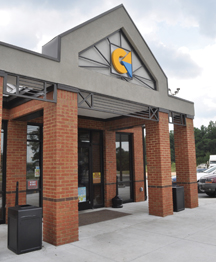 The Georgia chain is updating its chicken program, testing a smaller format barbeque restaurant and rolling out a larger convenience store size.
The Georgia chain is updating its chicken program, testing a smaller format barbeque restaurant and rolling out a larger convenience store size.
By Erin Rigik, Senior Editor/News&Online
As part of its ongoing effort to satisfy today’s on-the-go customers, Clyde’s Market with 43 convenience stores in Georgia, is applying lessons from its Rusty Pig barbeque restaurant business to take its foodservice to the next level.
In addition, the chain is testing a new larger store format store to entice c-store customers with a multitude of offerings under one roof.
Courting Customers With Quality Food
Clyde’s Market takes foodservice seriously and as a result has seen its profits skyrocket. Eighteen of its stores offer a Hunt Brothers Pizza program, and seven feature its Aggie’s Fish and Chicken proprietary full-service delis that include a fried chicken and fish fillet offering. Clyde’s also does a grab-and-go business, including cold case sandwiches, a Johnsonville Sausage program and hot peanuts. In 2014 the chain plans to further build its foodservice profile by rolling out its Rusty Pig barbeque restaurant offering to its c-stores.
“Over the years we’ve partnered with various foodservice partners, co-branding for our chicken and our chicken batter. About 5-6 years ago, we decided we could do it better ourselves,” Greg Woolard, Clyde’s Market’s CEO, told CSD. “Then we went through a big change in our foodservice 3-4 years ago, which started because we built our first barbeque restaurant four years ago that is separate from our stores. In running the barbeque restaurant we learned a lot about foodservice at that time.”
Chief among the lessons was that if the foodservice quality and portions are up to par, customers don’t mind paying a bit more.
“In the c-store industry, for 20 years, we’ve figured out the cost of an item and that dictates what we sold, meaning we’d try to get it cheap and try to get it to a price point the public could afford. But the barbeque restaurant taught us it’s not about having the cheapest chicken tenders you can find,” Woolard said.
Clyde’s went to work, changing its products, including rethinking its breading and chicken tender, as well as the type of fish fillet it offered. “We were running a 2.5-ounce chicken tender, and it was tough, but it was cheap. We changed to a 1.75-ounce tender, and it’s a much better tender,” Woolard said. “Restaurants and stores in Georgia usually offer the white fish fillet, but we switched to a cat fish fillet—a much better cut, and started offering it daily instead of just on Fridays.”
The changes resulted in 12-18% growth in Clyde’s new quality-oriented foodservice program over the past three years.
But the changes are just starting. Clyde’s is set to break ground on its third standalone Rusty Pig barbeque restaurant in March—the business is expected to be up and running by July. And it’s taking its barbeque business into its c-stores as well. This February it rolled out its Rusty Pig c-store barbeque program at five test locations, with a goal to roll it out to 12-15 stores by mid-summer.
Taking a restaurant offering and converting it to a c-store offering is not without challenges. “We’re not set up to distribute, so we have to package the meat, and we don’t have the facility to package so, for now, we’re doing that in house, by hand,” Woolard said.
Another concern is maintaining freshness. “We’re doing it all with refrigerated—not frozen product—because anytime you freeze meat it will dry out. But anytime you refrigerate meat it can dry out too,” Woolard explained.
To ensure freshness, the chain decided to sauce its meat, which is prepared hot for the customer at the c-store. “At the barbeque restaurant our meat is not sauced, but we sauced it for the c-store version to keep the moisture in it, so it can sustain itself a little bit better. We have a 3-5 day window for it to get to the store, get merchandised and get sold,” he said.
Growing For The Future
In August, Clyde’s opened a new, larger convenience store prototype. The new location features a more upscale look, complete with two canopies, wood trusses, a larger parking lot and a 3,500-square-foot store footprint.
“We’re just testing the waters because this larger, more upscale format is where the industry appears to be headed. It’s expensive. Ten years ago you could build a c-store for $600,000-$700,000—and now it’s more than double that,” Woolard noted.
The third Rusty Pig restaurant is being constructed on a piece of property where the company also plans to construct a convenience store in the future. While the two buildings won’t share the same roof structure, Woolard hopes the two locations could help drive business to each other, as well as off-set the cost of the property. Clyde’s Market will be monitoring the success of the new model to determine if it’s one it wants to replicate in the future.
Best Practices
Overall, Clyde’s Market works to differentiate itself by doing the basics right, as well as providing quality food and superior customer service. It shows its support for the community through a variety of charitable causes, including the St. Jude’s program. “Our main beneficiary is the military. In April we run a golf tournament that benefits the families of fallen soldiers and is a big focus of our organization,” Woolard said.
“We put a lot of emphasis on customer service, getting people in and out of the stores fast and keeping our stores clean,” Woolard added. “We try to do the little things right because at the end of the day it makes a big difference.”
The Beginning
Clyde Woolard founded the company in 1969. Born and raised in Folkston, Ga., he managed a convenience store in Waycross, Ga., for his brother-in-law, Carl Jones, founder and owner of Flash Foods.
After a time, Woolard decided he was ready to apply what he had learned by opening his own c-store business in Glennville, Ga. In 1974, Woolard built his second store in Reidsville, Ga., complete with a deli. Several years later, he closed the deli and added a gas island to the forecourt. The store was the only self-service gas pump around for miles, and Woolard never built another store without fuel pumps again. In the mid 1980’s he purchased his first oil company—AG Oliver Oil Co., and renamed the company Tattnall Oil.
In 2003, Woolard purchased his second oil company, Brilad Oil Co., and the company’s name changed again, this time to Wooland Oil. With the two oil entities combined, the business has reached a fuel volume in excess of 35 million gallons per year. Clyde’s son, Greg Woolard, joined the company in 1989, first driving a fuel truck and then working in the stores, before working his way up to CEO.
Clyde’s Market at a GLANCE
Founded: 1969 by Clyde Woolard
Headquarters: Glennville, Ga.
Store Count: 43 stores, all in Georgia
Foodservice: Seven Aggie’s proprietary delis; 18 Hunt Brothers Pizzas, Rusty Pig standalone restaurants (two, with one under construction); Rusty Pig c-store offering being tested at five locations currently.
Executive Team:
Clyde Woolard, Founder/Owner, President
Greg Woolard, CEO
Neal Anderson, Chief Operating Officer
AJ Gambino, Marketing Executive
Gene Edwards, Chief Financial Officer




